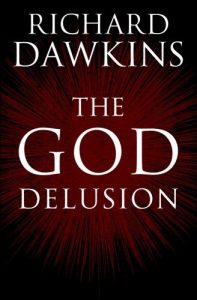
Last week, I began a book review of The God Delusion by Richard Dawkins, broken up into two parts. This book was a monumental work of atheist thought by arguably the best-known atheist of our time. The first part was written as an attempt to understand atheists at a deeper, closer level.
If we want to reach them, we have to understand them.
If we don’t understand them, we quarantine them in our heads.
It’s simply not a good mindset for any evangelist. Read Part 1 here.
Part 2
I want to move to a critique of some of Dawkins’ main points in the book. (The 2008 Paperback edition, which I am using, is over 400 pages long. For the sake of space, I am forced to be extremely selective, so don’t expect a thorough review.)
I’ll start with the quote from Part 1:
Page 51: “The God of the Old Testament is arguably the most unpleasant character in all fiction: jealous and proud of it; a petty, unjust, unforgiving control-freak; a vindictive, bloodthirsty ethnic cleanser; a misogynistic, homophobic, racist, infanticidal, genocidal, filicidal, pestilential, megalomaniacal, sadomasochistic, capriciously malevolent bully. Those of us schooled from infancy in his ways can become desensitized to their horror.”
I won’t deny that the Old Testament has a lot of challenging passages. Although it takes some time to completely work the answer out, we will never understand the nature of God in the Old Testament until we have a good understanding of the holiness of God, the power of sin, the cross of Christ, and the old and new covenants. Dawkins never mentions this. Why doesn’t he go there? Maybe the reason that Dawkins doesn’t engage at the level of theological thinking is because he has heard ill-prepared counters and thinks that’s all we are able to supply to his challenge. He admits to his critics that he hasn’t deeply involved himself in theology because (Page 15): “Most of us happily disavow fairies, astrology and the Flying Spaghetti Monster, without first immersing ourselves in books of Pastafarian theology etc.” More on that later.
In Chapter 3, Dawkins systematically goes through eight arguments for the existence of God and works to lay waste each one. I will lay them out and define them according to how Dawkins defines them.
- The proofs of Thomas Aquinas (Which is actually 5 arguments, mostly pointing toward the problem of infinite regress which God is the solution to, along with an argument that things look designed, etc.)
- The Ontological argument (Such a thing exists as an “idea” of a perfect god. Since a perfect god is only perfect if he dwells in reality, a perfect god must exist in reality.)
- The argument from beauty (We have marvelous art from people like Michelangelo who was Christian, and whose artistry flowed from their connection with God. Therefore, God exists.)
- The argument from personal experience (I have seen God, or I have heard His voice. Therefore, God exists.)
- The argument from scripture (Jesus was either Lord, a Liar, or a Lunatic.)
- The argument from admired religious scientists (Many great scientists were/are religious. Who are you to oppose them?)
- Pascal’s Wager (If you, an atheist, are wrong, you’re in trouble. If I’m wrong, it makes no difference.)
- Bayesian arguments (If you take the evidences for and against God, assign a value to their persuasiveness, and add it all up, you will see mathematical proof that God is more likely to exist than he isn’t.)
(Again, my definitions of these arguments for God are according to how Dawkins defined them.)
You may have noticed that several of these points were already weak to begin with. Five of them I would never use myself (at least, not in the way Dawkins defined them). They probably come from religious people who are pressured to provide a reason why they believe without really knowing themselves. As such, they grasp at whatever they can and convince themselves that it’s a good argument. Some of the above arguments are good, but many of them are bogus, and they don’t appear in any notable book on apologetics. Please, if you are a Christian, learn to defend your faith well.
Chapter 4 was much more interesting to me. Here Dawkins defends evolution, and touches on the argument which points out the fine-tuning of the universe. Without immersing myself into debate, I believe that this statement will provide an accurate picture of what this chapter is all about, taken from Pages 146-147:
“Creationist ‘logic’ is always the same. Some natural phenomenon is too statistically improbable, too complex, too beautiful, too awe-inspiring to have come into existence by chance… And science’s answer to this faulty logic is also always the same. Design is not the only alternative to chance. Natural selection is a better alternative… [It] is a cumulative process, which breaks the problem of improbability up into small pieces. Each of the small pieces is slightly improbable but not prohibitively so.”
 If it helps with dialogue, then I’ll start using “Natural Selection” instead of “chance” even though the former is powered by the latter. But it’s still not that simple. The atheist Fred Hoyle once said that the emergence of life (something inextricably bound to Darwinism) would be like a tornado sweeping through a junkyard and constructing a Boeing 747.* After expressing shock that a scientist would despair the emergence of life by naturalistic processes, Dawkins concludes: “At an intellectual level, I suppose he understood natural selection. But perhaps you need to be steeped in natural selection, immersed in it, swim about in it, before you can truly appreciate its power.” (pg. 142-143) It’s a shame he’s unwilling to grant that same respect toward theology, comparing its strength to fairies, when he so readily questions God in the Old Testament.
If it helps with dialogue, then I’ll start using “Natural Selection” instead of “chance” even though the former is powered by the latter. But it’s still not that simple. The atheist Fred Hoyle once said that the emergence of life (something inextricably bound to Darwinism) would be like a tornado sweeping through a junkyard and constructing a Boeing 747.* After expressing shock that a scientist would despair the emergence of life by naturalistic processes, Dawkins concludes: “At an intellectual level, I suppose he understood natural selection. But perhaps you need to be steeped in natural selection, immersed in it, swim about in it, before you can truly appreciate its power.” (pg. 142-143) It’s a shame he’s unwilling to grant that same respect toward theology, comparing its strength to fairies, when he so readily questions God in the Old Testament.
Still, probably the biggest point that Dawkins tries to make is that even if God is a probable answer to complexity, life, and the cosmos, where did God come from? Even more, if God is so sophisticated as to make all this complex stuff, He is even more complex and impossible to explain than the stuff he made! By positing God, Dawkins argues that we actually push the whole problem of complexity back, and at the same time enlarge the problem even more. This, in my opinion is one of his most powerful arguments of the book. Theists argue for a God who is eternal, all-powerful, and all-knowing. To be “all powerful” and “all-knowing” is not a complex thing to conceptualize, and there’s no reason to frame God in a sense where this kind of ability would have to be a result of an incredibly complex system like our natural world would demand. But it’s frightfully difficult to imagine this is possible without God being eternal, outside of time. Once that’s established, the question of complexity becomes irrelevant, because God never evolved into His current state. This may seem like a cop-out, but an eternal God is not much different of a brain-teaser than an eternal universe that atheists once held before the Big Bang was established.
One of the main themes throughout the entire book of the God Delusion is that science is an enemy of God. This is such a common sentiment among so many atheists. But it’s somewhat rare among theists. I think John Lennox says it best in his book God’s Undertaker:
Page 16: “Admittedly, there unfortunately are people professing faith in God who take an overly anti-scientific and obscurantist viewpoint… Perhaps Richard Dawkins has had the misfortune to meet disproportionately many of them. But that does not alter the fact that mainstream Christianity will insist that faith and evidence are inseparable. Indeed, faith is a response to evidence, not a rejoicing in the absence of evidence.”
Page 48: “God is not an alternative to science as an explanation, he is not to be understood merely as a God of the gaps. On the contrary, he is the ground of all explanation: it is his existence which gives rise to the very possibility of explanation, scientific or otherwise. It is important to stress this because influential authors such as Richard Dawkins will insist on conceiving of God as an explanatory alternative to science – an idea that is nowhere to be found in the theological reflection of any depth. Dawkins is therefore tilting at a windmill – dismissing a concept of God that no serious thinker believes in anyway.”
In short, so much of everything that Richard Dawkins devotes his effort to as a writer is one massive straw-man argument. That is, he is (unknowingly?) reconstructing his opposing viewpoint to be easy to defeat. He spends time on the ugly history of the church, and the crazies of its faith. It seems that Dawkins and I share a similar goal. We don’t like bigoted, uneducated, destructive, mean, religious know-it-all’s. The difference is that Dawkins thinks the problem is on religion and the solution is to get rid of it. Not so. The problem is a malpractice of religion and the solution is to bring it back to its original design—a relationship—as God made it. Your relationship with God is meant to benefit those around you.
Yet this all comes from a heavy weight that we Christians ought not to ignore. How does Dawkins respond to this straw-man?
Page 15: “If only such subtle, nuanced religion predominated, the world would surely be a better place, and I would have written a different book. The melancholy truth is that this kind of understated, decent, revisionist religion is numerically negligible. To the vast majority of believers around the world, religion all too closely resembles what you hear from the likes of Robertson, Falwell, or Haggard, Osama bin Laden or the Ayatollah Khomeini. These are not straw men, they are all too influential, and everybody in the modern world has to deal with them.”
Certainly, Dawkins has been persuaded by the media’s portrayal of Christianity and religion in general. And I’m sure his fame attracts the audience of the more mean-spirited religious type. But let’s not flatter ourselves too quickly…
I opened Part 1 of this book review by describing a presentation by Sean McDowell where he takes on an atheist worldview, and essentially plays “stump the atheist” with the Christian attendees. When Sean takes off his atheist glasses, the whole audience is relieved that it’s over. No more need to boldly proclaim the truth of God to this foolish non-believing Sean McDowell; we have our apologist back! With fifteen minutes left on stage, how do you expect Sean will close up? Surprisingly, when there is shortage of time, he doesn’t go back through the interactions and point out where his atheist self was mistaken. Instead, he takes the opportunity to ask a new question back to his audience:
“How did you treat me as your atheist?”
Every time he does this, the entire room goes silent. Tweet
I would agree with Ravi Zacharias who once said “The greatest apologetic is a life that is properly lived.”
If people like Richard Dawkins are still writing books that condemn Christianity for its un-appeal, then we still have work to do. We have to slow down and listen. We have to stop the atheist jokes. We have to consider how we look from an outside perspective. We have to stop battling against flesh and blood. Instead, let’s see these people through the eyes of God, who loves them no less than He loves us. Christians don’t always give a good picture of who Jesus actually is. But if they did, our world would want Him. Regardless that some people are just blind to the fact, everybody wants a King like Jesus.
*Fred Hoyle, The Intelligent Universe, pg. 19
Work Cited: Dawkins,, R. (2008), The God Delusion. Boston, NY: Mariner Books.
** Image Fair use, https://en.wikipedia.org/w/index.php?curid=5422004
About the Author



